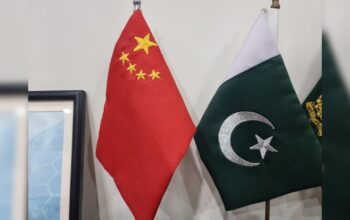By Staff Reporter
ISLAMABAD: Pakistan is pressing ahead with plans to sell its national airline, Pakistan International Airlines (PIA), targeting final bids by October and a completed deal by year-end, the country’s privatization chief said, marking Islamabad’s most determined push yet to offload the loss-making carrier after decades of failed attempts and billions in taxpayer bailouts.
The sale is a cornerstone of Pakistan’s effort to shed state-owned enterprises that have bled the public treasury and destabilized the economy for years, a condition tied to a $7 billion International Monetary Fund bailout critical to staving off default and tackling a mounting debt crisis. PIA, once a symbol of prestige in Asian aviation, has racked up over $2.5 billion in losses in the past decade, dragged down by political meddling, corruption, and operational inefficiencies.
Five consortia, all local, with one including a non-resident Pakistani group, submitted expressions of interest last week for a 51% to 100% stake in PIA. To sweeten the deal, the government has overhauled the airline’s finances, shifting about 80% of its debt to the state, scrapping sales tax on leased aircraft, and offering limited shields from legal and tax claims.
“There are five expressions of interest from five different consortiums,” Muhammad Ali, chairman of the Privatization Commission, told Arab News in an interview on Monday. “We are hoping that sometime in September–October we should have the final bidding but in any case, before the end of the year we will wrap it up.”
A Leaner PIA Emerges
The restructuring has carved PIA’s decades-old bank debt into a separate holding company, leaving a slimmed-down operation focused on passengers, cargo, and engineering. “So, PIA, the aviation, the core company which we are privatizing, that doesn’t have that debt anymore,” Ali said. The airline, buoyed by this cleanup, posted its first operating profit in 21 years for the period ending June 2024, bolstered by resumed European routes.
Ali outlined the next steps: shortlisting bidders by June’s end, opening a data room in July, and allowing 60 days for due diligence before final talks in September or October. “We’ll be pre-qualifying them and all five may or may not qualify to go into the due diligence process,” he said.
Minority Stake, Majority Control
The government aims to keep a 20% to 25% stake, a move Ali said would let it profit if PIA’s fortunes rise post-sale, without meddling in its operations. “Frankly, the government is not interested in controlling this entity anymore,” he said. “From a control element, we want the private sector to be totally authorized to take all the decisions.” Still, he added, “the government would want to make some money off it” if the airline thrives.
Pakistan’s state firms lose over Rs850 billion annually, a burden that balloons past Rs1 trillion with subsidies and grants, Finance Minister Muhammad Aurangzeb told parliament this month. PIA has been a prime culprit, leaning on repeated bailouts that have strained an already fragile budget.
Learning From Past Flops
A prior attempt to sell PIA faltered when a $36 million offer from Blue World City undershot the $305 million floor price for a 60% stake, tripped up by debt concerns and limited control. Ali said the reference price could climb higher this time, citing PIA’s nascent recovery and prospects like a potential UK route clearance to boost revenue. “It’s a great asset, frankly. It’s not losing money, it’s making money,” he said. But he warned Islamabad would walk away again if bids disappoint: “If we have to wait a bit, we will wait it out a bit.”
The lack of foreign bidders has raised eyebrows, but Ali shrugged off the concern. “If a local group takes it, I’m very happy,” he said, noting Pakistani buyers could later rope in overseas airlines. He also distanced PIA’s sale from the botched 2006 privatization of Pakistan Telecommunication Company Limited, where Etisalat withheld $800 million over property disputes. “In case of PIA, there is no issue as far as land title or anything like that is concerned,” he said, promising upfront proceeds for the majority stake.
IMF Pressure and Modest Targets
The sale aligns with Pakistan’s pledge to curb state-owned losses under its latest IMF deal, aiming to raise Rs86 billion ($309 million) in privatization proceeds next fiscal year—roughly the old floor price for PIA—alongside sales like the Roosevelt Hotel in New York. Yet, with state firms hemorrhaging Rs850 billion yearly, Ali admitted the goal is a drop in the bucket. “In order to get rid of this Rs850 billion loss to the exchequer, we need to have a very, very aggressive privatization and deregulation agenda,” he said.
The Privatisation Commission, in a statement, underscored the process’s rigor, noting three parties were disqualified for missing the Statements of Qualification deadline, while a group of PIA employees failed to formally bid despite an extension. It also corrected reports by highlighting “a consortium featuring two foreign entities,” signaling some international interest, and warned that “misleading reports … risk undermining investor confidence.”
Copyright © 2021 Independent Pakistan | All rights reserved




